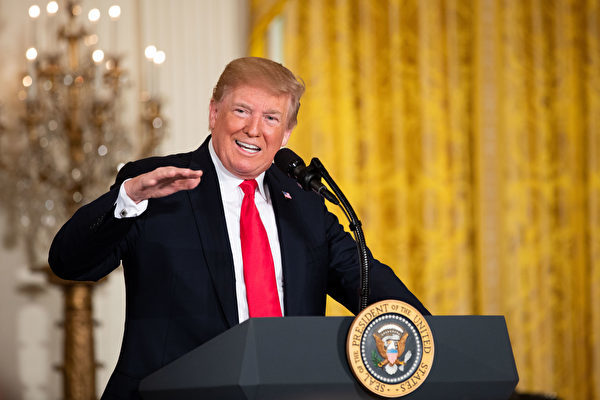Trump is bound to continue and escalate some of the strategies from the 2020 U.S.-China new Cold War in his new term, waging a political war against the CCP. The image shows a file photo of Trump. (Samira Bouaou/Dajiyuan)
(People News) During his campaign and transition period, Trump repeatedly vowed to impose tariffs on Chinese goods, potentially 60% or more. These tariffs would also apply to Chinese products routed through countries like Mexico, Canada, and Peru. Trump has consistently pledged to address what he calls the "greatest threat to the United States"—China. His strategic focus on areas like the Panama Canal and Greenland underscores his intent to counter China. Many of Trump’s cabinet nominees are known for their strong anti-China and anti-Communist stances. All of this has undoubtedly put Xi Jinping on edge. As Trump assumes office, how will Beijing respond? Here are a few notable developments:
1. Xi Jinping’s Calls for Reform and Opening Up:
The CCP’s Qiushi magazine recently published an internal speech by Xi Jinping from last October, seemingly advocating a restart of reform and opening up. However, this is too little, too late. Neither the U.S. nor Trump are banking on this. Marco Rubio, Trump’s nominee for Secretary of State, exposed the true nature of China’s "reform and opening up" during a Senate hearing:
“We welcomed the Chinese Communist Party into the global order. They have reaped all the benefits of this order while ignoring its obligations and responsibilities. Instead, they have achieved superpower status through lies, deceit, hacking, and theft—at the expense of our interests.”
2. Falsified Economic Growth Figures:
Beijing has claimed a 5% GDP growth rate for last year, hoping to deter Trump from underestimating China's economic strength. However, few believe these figures. Not only do foreigners doubt them, but so do Chinese citizens. Many economists estimate the real growth rate at 2%, zero, or even negative. Those who question the official data are silenced, banned, or dismissed. Local governments face financial deficits and mounting debt, with industries, employment, wages, and consumer spending all shrinking. The supposed 5% growth is a fabrication, built on two tactics: inventing official statistics and silencing dissenters.
3. Trump’s Invitation to Xi Jinping: In a strategic move, Trump directly invited Xi to attend his inauguration. This left Xi momentarily stunned, unsure of how to respond. Fearing a trap and overwhelmed by the pressure, Beijing eventually devised a plan: Vice President Han Zheng would attend on Xi’s behalf, marking the highest-level Chinese attendance at a U.S. presidential inauguration. In the past, such events were typically attended by the Chinese ambassador to the U.S.
After announcing Han Zheng’s trip, Xi quickly called Trump to show that he still holds power and remains in charge. However, rumors persist domestically and internationally that Xi’s authority has been somewhat weakened since last July’s Third Plenum, especially in military affairs.
At this moment, what causes the greatest embarrassment for Xi Jinping and Beijing is that Senator Marco Rubio, who was previously sanctioned by the CCP, has now been appointed Secretary of State by Trump. This level of awkwardness is comparable to the CCP's Global Times publishing the bombastic article "Farewell, Trump" in early 2021—only for Trump to make a political comeback, rendering Beijing speechless.
The CCP’s sanctions against Rubio included denying him a visa and barring his entry into China. Yet, in a twist of irony, Rubio, as Secretary of State, is now poised to undertake extensive diplomatic missions, including potential visits to China or accompanying Trump on his reported trip to China within the first 100 days of his presidency. How will Beijing handle this situation?
True to its nature, the brazen CCP has its own methods. One such tactic is to subtly rename Rubio in party media, tweaking the translation of his name from "卢比奥" to "鲁比奥." This minor alteration appears aimed at deceiving the domestic audience and saving face. The idea seems to be that, at least in front of the Chinese public, they can sweep the issue under the rug and preserve their dignity. But does the CCP truly believe that under Xi Jinping’s rule, the general public in China has collectively regressed to an elementary school level of comprehension?
Faced with Trump’s assertive return, Beijing’s reactions reveal anxiety, confusion, insecurity, and panic—resulting in chaotic decision-making. Trump’s presidency, characterized by both praise and tough measures against Xi, is expected to bring significant developments. Observers of U.S.-China relations eagerly await what could be a dramatic showdown on the world stage.
(Translated from Radio Free Asia)











News magazine bootstrap themes!
I like this themes, fast loading and look profesional
Thank you Carlos!
You're welcome!
Please support me with give positive rating!
Yes Sure!